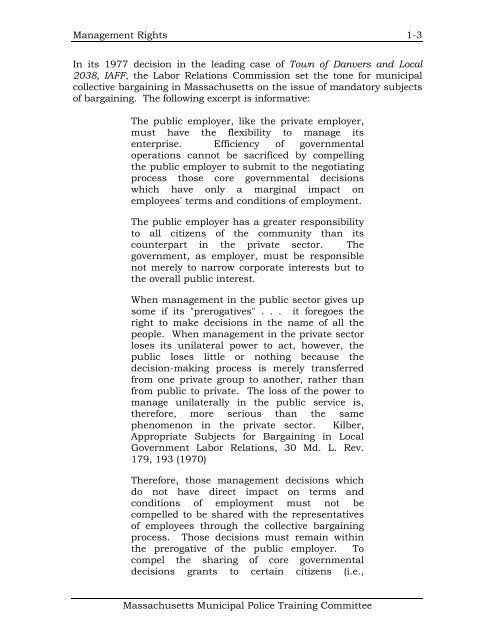Management Rights - AELE's Home Page
Management Rights - AELE's Home Page
Management Rights - AELE's Home Page
Create successful ePaper yourself
Turn your PDF publications into a flip-book with our unique Google optimized e-Paper software.
<strong>Management</strong> <strong>Rights</strong> 1-3<br />
In its 1977 decision in the leading case of Town of Danvers and Local<br />
2038, IAFF, the Labor Relations Commission set the tone for municipal<br />
collective bargaining in Massachusetts on the issue of mandatory subjects<br />
of bargaining. The following excerpt is informative:<br />
The public employer, like the private employer,<br />
must have the flexibility to manage its<br />
enterprise. Efficiency of governmental<br />
operations cannot be sacrificed by compelling<br />
the public employer to submit to the negotiating<br />
process those core governmental decisions<br />
which have only a marginal impact on<br />
employees' terms and conditions of employment.<br />
The public employer has a greater responsibility<br />
to all citizens of the community than its<br />
counterpart in the private sector. The<br />
government, as employer, must be responsible<br />
not merely to narrow corporate interests but to<br />
the overall public interest.<br />
When management in the public sector gives up<br />
some if its "prerogatives" . . . it foregoes the<br />
right to make decisions in the name of all the<br />
people. When management in the private sector<br />
loses its unilateral power to act, however, the<br />
public loses little or nothing because the<br />
decision-making process is merely transferred<br />
from one private group to another, rather than<br />
from public to private. The loss of the power to<br />
manage unilaterally in the public service is,<br />
therefore, more serious than the same<br />
phenomenon in the private sector. Kilber,<br />
Appropriate Subjects for Bargaining in Local<br />
Government Labor Relations, 30 Md. L. Rev.<br />
179, 193 (1970)<br />
Therefore, those management decisions which<br />
do not have direct impact on terms and<br />
conditions of employment must not be<br />
compelled to be shared with the representatives<br />
of employees through the collective bargaining<br />
process. Those decisions must remain within<br />
the prerogative of the public employer. To<br />
compel the sharing of core governmental<br />
decisions grants to certain citizens (i.e.,<br />
Massachusetts Municipal Police Training Committee
















